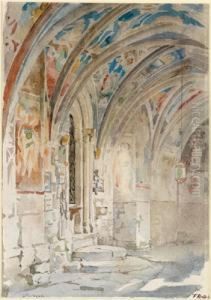Friedrich Johann Reusch Paintings
Friedrich Johann Justin Reusch was a German sculptor and medallist, known for his works in the mid-19th to early 20th century. Born on November 2, 1831, in Darmstadt, Germany, Reusch was initially trained in his home city before moving on to further his education in the arts. His early career saw him working in various capacities, most notably in sculpture, which was the medium where he found his true calling.
Reusch's work was characterized by a blend of classical styles with the emerging trends of his time. He participated in a period of art where there was a transition from Neoclassicism towards more modern approaches, including Realism and eventually Impressionism, although these later styles did not heavily influence his work. Instead, Reusch remained largely committed to the classical tradition, producing works that emphasized form and detail, typical of the academic standards of the era.
Throughout his career, Reusch created numerous busts, statues, and medals that were well received by the public and critics alike. His contributions to art were recognized in his time, and he was respected by his contemporaries. Reusch's works were often inspired by historical and mythological themes, reflecting a common trend among artists of his period to draw upon the rich tapestry of the past for inspiration.
The latter part of Reusch's life saw him continuing to produce works, although the details of his later career are less documented than his earlier years. Friedrich Reusch passed away on March 14, 1908, in his native Darmstadt, leaving behind a legacy of art that is appreciated by historians and collectors. His works are a testament to the craftsmanship and artistic sensibilities of 19th-century German sculpture, capturing the essence of that era's cultural and aesthetic values.
